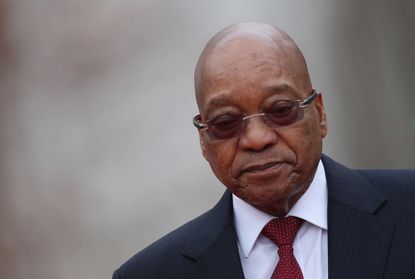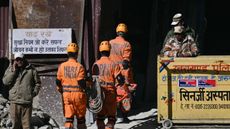Will South African President Jacob Zuma be impeached?
There are growing calls for him to be removed from power after yesterday's damning Nkandla verdict

South Africa's opposition has filed a motion to have President Jacob Zuma impeached after the nation's highest court ruled that he had violated the constitution.
In a damning verdict likely to have far-reaching political consequences, the Constitutional Court declared that the president failed to "uphold, defend and respect" the nation's constitution.
Yesterday's judgment relates to Zuma's failure to return state funds used to improve his rural residence. The ruling African National Congress (ANC) responded to the verdict with a short statement saying it welcomed and accepted the court's judgement.
Subscribe to The Week
Escape your echo chamber. Get the facts behind the news, plus analysis from multiple perspectives.

Sign up for The Week's Free Newsletters
From our morning news briefing to a weekly Good News Newsletter, get the best of The Week delivered directly to your inbox.
From our morning news briefing to a weekly Good News Newsletter, get the best of The Week delivered directly to your inbox.
Zuma's final term as president doesn't end until 2019 – but a growing number of people want to see him removed from office long before then.
How did he get here?
The political saga started six years ago, with upgrades to Zuma's Nkandla mansion in the KwaZulu-Natal province.
The 73-year-old leader insisted that the money was being spent on security upgrades, but his lawyer has since admitted that improvements included a swimming pool, amphitheatre and cattle enclosure.
In 2014, an investigation by the public protector estimated that the total cost to the South African taxpayer totalled £15m.
"Zuma's primary sin wasn't that he had the state upgrade his homestead, but that he covered it up; that he denied that he knew about it or asked for it;" Max Du Preez writes for News24.
The court case was brought by the Democratic Alliance (DA), the country's main opposition group, as well as the Economic Freedom Fighters (EFF), a socialist party that splintered off the ANC.
Zuma has suffered numerous scandals in recent years and has become increasingly unpopular with voters. His approval rankings have plummeted from 64 per cent in 2011 to 36 per cent this year.
His decision to fire Nhlanhla Nene, the country's respected finance minister, triggered nationwide protests and saw the rand nose-dive in December. "The episode solidified his reputation for capricious decision-making," says The Economist.
Zuma's cosy relationship with a prominent Indian business family, the Guptas, has given his critics further ammunition.
What did the court rule?
In a unanimous judgement, the court ruled that Zuma had flouted the constitution by not reimbursing the state and ordered him to pay back a portion of the costs. The judges also pointed the finger at the ANC-dominated parliament for failing to hold the president to account.
Delivering the verdict, chief justice Mogoeng Mogoeng told public officials to remember that the law is the "sharp and mighty sword that stands ready to chop the ugly head of impunity from its stiffened neck".
The ruling has been widely viewed as welcome proof of the judiciary's independence and the health of the country's young democracy. "It has shown that it will protect the public from the abuse of power and will not be a political crony of the government," says the BBC's Milton Nkosi.
So are his days numbered?
Under South African law, a president can be impeached in the event of a serious violation of the constitution or the law, serious misconduct, or inability to perform functions of the office. The ruling party can also file a vote of no confidence in the leader.
But as the Rand Daily Mail points out, the question then becomes what kind of breach warrants impeachment. "Judgments on what 'serious' means are scant," it says. And even if a president is found to have made a serious breach, it doesn't automatically mean he will be ousted from power.
"Impeachment is a political process, not a legal one," political analyst Steven Friedman told the Independent Online. So with a two-thirds parliamentary majority needed to get rid of Zuma, the decision ultimately lies with the ANC.
"It is very difficult to see how the ANC can continue to have President Zuma at the helm," says Nkosi.
Friedman disagrees, arguing that there is little appetite within the party to oust their leader. The real threat to Zuma's presidency is the upcoming local government elections, he says.
Professor Joleen Steyn Kotze, a political studies lecturer at the Nelson Mandela Metropolitan University, issued a similar warning.
"Zuma is the face of the ANC, he is on every billboard and poster," she said. "The ANC will have to make some tough decisions."
Create an account with the same email registered to your subscription to unlock access.
Sign up for Today's Best Articles in your inbox
A free daily email with the biggest news stories of the day – and the best features from TheWeek.com
-
 Antony Gormley's Time Horizon – a 'judgmental army' of 100 cast-iron men
Antony Gormley's Time Horizon – a 'judgmental army' of 100 cast-iron menThe Week Recommends Sculptures are 'everymen questioning the privilege of their surroundings' at the Norfolk stately home
By Adrienne Wyper, The Week UK Published
-
 'King's horses take free rein through London'
'King's horses take free rein through London'Today's Newspapers A roundup of the headlines from the US front pages
By The Week Staff Published
-
 Is pop music now too reliant on gossip?
Is pop music now too reliant on gossip?Talking Point Taylor Swift's new album has prompted a flurry of speculation over who she is referring to in her songs
By Richard Windsor, The Week UK Published
-
 Puffed rice and yoga: inside the collapsed tunnel where Indian workers await rescue
Puffed rice and yoga: inside the collapsed tunnel where Indian workers await rescueSpeed Read Workers trapped in collapsed tunnel are suffering from dysentery and anxiety over their rescue
By Sorcha Bradley, The Week UK Published
-
 Gaza hospital blast: What the video evidence shows about who's to blame
Gaza hospital blast: What the video evidence shows about who's to blameSpeed Read Nobody wants to take responsibility for the deadly explosion in the courtyard of Gaza's al-Ahli Hospital. Roll the tape.
By Peter Weber, The Week US Published
-
 Giraffe poo seized after woman wanted to use it to make a necklace
Giraffe poo seized after woman wanted to use it to make a necklaceTall Tales And other stories from the stranger side of life
By Chas Newkey-Burden, The Week UK Published
-
 Helicopter sound arouses crocodiles
Helicopter sound arouses crocodilesTall Tales And other stories from the stranger side of life
By Chas Newkey-Burden, The Week UK Published
-
 Woman sues Disney over 'injurious wedgie'
Woman sues Disney over 'injurious wedgie'Tall Tales And other stories from the stranger side of life
By Chas Newkey-Burden, The Week UK Published
-
 Emotional support alligator turned away from baseball stadium
Emotional support alligator turned away from baseball stadiumTall Tales And other stories from the stranger side of life
By Chas Newkey-Burden, The Week UK Published
-
 Europe's oldest shoes found in Spanish caves
Europe's oldest shoes found in Spanish cavesTall Tales And other stories from the stranger side of life
By Chas Newkey-Burden, The Week UK Published
-
 Artworks stolen by Nazis returned to heirs of cabaret performer
Artworks stolen by Nazis returned to heirs of cabaret performerIt wasn't all bad Good news stories from the past seven days
By The Week Staff Published